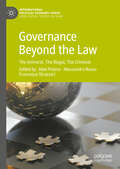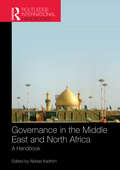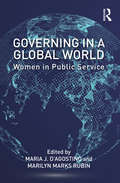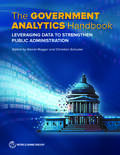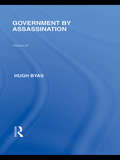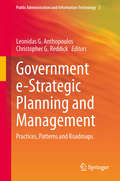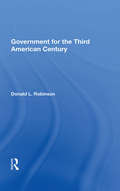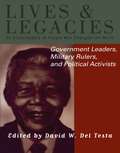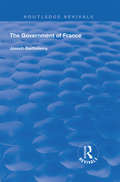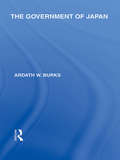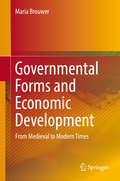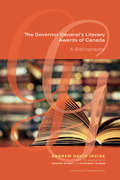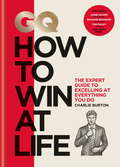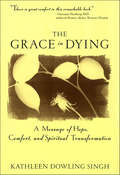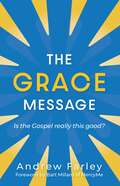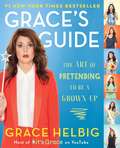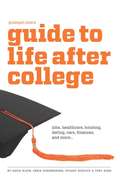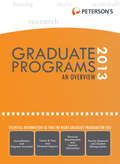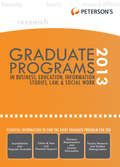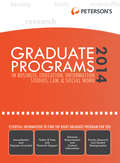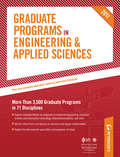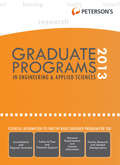- Table View
- List View
Governance Beyond the Law: The Immoral, The Illegal, The Criminal (International Political Economy Series)
by Abel Polese Alessandra Russo Francesco StrazzariThis volume explores the continuous line from informal and unrecorded practices all the way up to illegal and criminal practices, performed and reproduced by both individuals and organisations. The authors classify them as alternative, subversive forms of governance performed by marginal (and often invisible) peripheral actors. The volume studies how the informal and the extra-legal unfold transnationally and, in particular, how and why they have been/are being progressively criminalized and integrated into the construction of global and local dangerhoods; how the above-mentioned phenomena are embedded into a post-liberal security order; and whether they shape new states of exception and generate moral panic whose ultimate function is regulatory, disciplinary and one of crafting practices of political ordering.
Governance in the Middle East and North Africa: A Handbook (Routledge International Handbooks Ser.)
by Abbas KadhimGovernance in the Middle East is topic of interest to scholars, activists and policy makers. The currently proposed book is intended to present the first comprehensive framework of the question of governance in the Middle East in its various forms and manifestations: political, economic, and government performance. This study will supply the context that is missing in the existing literature on, perhaps, the last bastion of authoritarianism in the world. Proposed Contents This book will be structured into two parts: Part I (Chapters 1-11) provides some theoretical background and analyzes the patterns and challenges of governance in the Middle East, providing some global context; Part II (12-Conclusion) will examine specific cases in selected countries and regions in the Middle East. Part I: Theory and Context Chapter 1 will be an introduction describing the main aspects of the book and highlighting the main points made by the contributors. Chapter 2 will present the theoretical dimensions of governance and review the "state of the discipline" and the latest trends in the literature on governance. The author of this chapter will be an authority in the subject of governance, but does not have to be necessarily a Middle East scholar. Chapter 3 will examine the general political trends in the Middle East and provide a historical background: nation-state formation, colonial and postcolonial experiences in the Middle East and the nature of the Middle Eastern political environment at the present time. Chapter 4 will look into the economic aspects of governance in the Middle East and contextualize the economic challenges and deficiencies affecting the region. Chapter 5 will examine the areas of success and failure in government performance in the region and the aspects of human development. Chapter 6 will look into the role of religion in shaping the governance in the Middle East. After all, most Middle Eastern governments declare Islam as the State religion, while a few consider Islam the source of governance and legislation (e.g. Saudi Arabia and Iran). Chapter 7 will shed light on the sectarian division among Muslims (Shi‘a vs. Sunnis) and the significance of this division for the governance, particularly in countries where the ruling groups belong to a different sect than the governed, such as Bahrain, Saudi, Kuwait and Lebanon. Chapter 8 will examine relation between the state of governance in the Middle East and the progress of human rights, or lack thereof. The Middle East remains one of the most troubling regions on human rights and the respect for human dignity. All of the region’s governments are heavily implicated in very serious violations of the most basic in human rights. Chapter 9 will focus on the status of women in the Middle East and the governmental performance in the region in relevance to women rights and status. The recent years have witnessed many positive changes in this regard, but there remains a lot of work to be done, which is going to be outlined in this chapter. Chapter 10 will look into the role of oil and other natural sources in shaping the economic and political performance of Middle Eastern governments. Also, it will shed light on the various ways these governments distribute the revenues (rents) from these resources and how they use them, or don’t, in the development of their countries or, in most cases, on the military and state oppressive machine. Chapter 11 will examine the role of international organizations and trade agreements on the performance of governments and whether or not such factors influence or shape governance in the region. It is well-known that Turkey has changed many of its laws and social policies in response to the demands of EU members and in hopes of being admitted into the EU. The chapter will elaborate on this and similar cases thr
Governing Digitally Integrated Genetic Resources, Data, and Literature
by Reichman, Jerome H. and Uhlir, Paul F. and Dedeurwaerdere, Tom Jerome H. Reichman Paul F. Uhlir Tom DedeurwaerdereThe free exchange of microbial genetic information is an established public good, facilitating research on medicines, agriculture, and climate change. However, over the past quarter-century, access to genetic resources has been hindered by intellectual property claims from developed countries under the World Trade Organization's TRIPS Agreement (1994) and by claims of sovereign rights from developing countries under the Convention on Biological Diversity (CBD) (1992). In this volume, the authors examine the scientific community's responses to these obstacles and advise policymakers on how to harness provisions of the Nagoya Protocol (2010) that allow multilateral measures to support research. By pooling microbial materials, data, and literature in a carefully designed transnational e-infrastructure, the scientific community can facilitate access to essential research assets while simultaneously reinforcing the open access movement. The original empirical surveys of responses to the CBD included here provide a valuable addition to the literature on governing scientific knowledge commons.
Governing in a Global World: Women in Public Service
by Maria J. D’Agostino Marilyn Marks RubinGoverning in a Global World captures the panorama of women governing around the world. Even though the modern era marks history’s greatest advancements for women, worldwide they hold fewer than 30 percent of decision-making positions and are often missing from negotiating tables where policies are made and conflicts resolved. The opening chapters present trends and context for studying women in public service by focusing on path-setters across the globe, the status of women in the world’s executive and legislative bodies, and their participation in public service across several nations. Later chapters examine power, leadership and representation of women in public service, with several chapters looking at women governing from a regional perspective in the Middle East, Sub Sahara Africa, Latin America, and China. The final chapter presents empirical evidence that shows how policies to increase women’s representation in the public arena reduce gender inequality more than any other policy intervention. Taken together, the chapters illustrate the worldwide importance of, and challenges to, promoting gender equality and women governing.
The Government Analytics Handbook: Leveraging Data to Strengthen Public Administration
by Daniel Rogger and Christian SchusterThe Government Analytics Handbook presents frontier evidence and practitioner insights on how to leverage data to strengthen public administration. Covering a range of microdata sources—such as administrative data and public servant surveys—as well as tools and resources for undertaking the analytics, it transforms the ability of governments to take a data-informed approach to diagnose and improve how public organizations work. Readers can order the book as a single volume in print or digital formats, or visit worldbank.org/governmentanalytics for modular access and additional hands-on tools. The Handbook is a must-have for practitioners, policy makers, academics, and government agencies. “Governments have long been assessed using aggregate governance indicators, giving us little insight into their diversity and how they can practically be improved. This pioneering handbook shows how microdata can be used to give scholars and practitioners granular and real insights into how states work, and practical guidance on the process of state-building.†? —Francis Fukuyama, Stanford University, author of State-Building: Governance and World Order in the 21st Century “The Government Analytics Handbook is the most comprehensive work on practically building government administration I have ever seen, helping practitioners to change public administration for the better.†? —Francisco Gaetani, Special Secretary for State Transformation, Government of Brazil “The machinery of the state is central to a country’s prosperity. This handbook provides insights and methodological tools for creating a better shared understanding of the realities of a state, to support the redesign of institutions, and improve the quality of public administration.†? —James Robinson, University of Chicago, coauthor of Why Nations Fail
Government by Assassination (Routledge Library Editions: Japan)
by Hugh ByasWritten by someone who spent twenty-three years as a journalist in Japan, this book describes the political and military aspirations of Japan at a tumultuous period of twentieth century history. The book examines the workings of the Japanese government and discusses the role of the military in shaping political ideals: ideals which were a compound of Marxism and National Socialism, transformed for Japanese uses and combined with fanatical racial, national and semi-religious obsessions.
Government e-Strategic Planning and Management
by Leonidas G. Anthopoulos Christopher G. ReddickVarious e-strategies have been developed since the late '90s in an attempt to describe the governmental vision for administrative and for societal change, the objectives and priorities with regard to the development of the Information and Communication Technologies (ICT) at national and at supranational levels. Terms such as the European "Information Society", the U. S. "Information Highways" and the Korean and Chinese "Informatization" try to describe social transformation that occurs due to the ICT, and to determine means with which governments will capitalize the ICT to improve social life and to support economic growth. This book focuses on the e-strategic management approaches that are followed worldwide, addresses the gaps that appear between e-strategic updates, and presents alternative strategic management methods adopted or to use strategic management methods as a means to describe the e-strategic evolution in their geographic areas. Each chapter evaluates e-strategic management approaches, to define multi-criteria decision-making systems for e-strategic transformation and Indicative methods for e-strategic analysis. This book also illustrates experiences from national and supranational cases, which come from different geographic areas regarding e-strategic planning and management, and demonstrates e-strategic initiation and development across different countries and continents, and the association between policies and ICT. It also seeks to perform a systematic analysis of various representative cases, in order to capture the realized e-Strategic transformation. It will be of interest to scholars and policy-makers in public administration, management, and information technology.
Government For The Third American Century
by Donald L RobinsonThis book is a primer for debate about the fitness of the American political system as it moves toward the twenty-first century. It focuses on structural matters: the electoral process, the major institutions of the federal government and how they interact, and what we can do when they perform ineffectively or abuse their powers. Part 1 presents a
Government Leaders, Military Rulers and Political Activists: An Encyclopedia Of People Who Changed The World (Lives And Legacies Ser. #Vol. 3)
by David W. Del TestaIn each volume, an introductory essay outlines of history of the disciplines under discussion, and describes how changes and innovations in these disciplines have affected our lives. The biographies that follow are organized in an A-Z format: each biography is divided into a "life" section describing the individual's life and influences and a "legacy" section summarizing the impact of that individual's work throughout history. These biographies cover a diverse group of men and women from around the globe and throughout history.Franklin Delano Roosevelt, Mao Tse-tung and Genghis Khan are among the 200 well-known historical figures included in this volume. Examples of other lesser-known, yet important, individuals covered in this work are: Gustavas Adolphus, Swedish empire creator; Hatshepsut, queen of ancient Egyptian dynasty; and Jean Jaurès, French socialist leader and pacifist. Each synopsis provides information on each individual's enduring impact on the common understanding of fundamental themes of human existence.
The Government of France (Routledge Revivals)
by Joseph BarthelemyOriginally published in 1919. French institutions of today, considered as a whole, form a composite building on which every new regime for the last hundred years has left its mark. The foundation is provided by the social, legal, judicial and administrative system of the Napoleonic Empire, which was crowned in 1875 by the corner-stone of parliamentary democracy. Many other features has been left by other regimes; thus France owes her general principles of common law and her administrative divisions to the Revolution.
The Government of Japan (Routledge Library Editions: Japan)
by Ardath BurksThis book takes a clear look at the course of the economic and political developments in Japan since the Second World War and in particular trends in government and politics since the peace treaty of 1952. It examines the disagreements within the country over re-armament and security; over neutralism versus commitment in the Cold War; over conflicting loyalties to an Asian or a European way of life; and over meeting the rising economic and social expectations of the new middle class.
Governmental Forms and Economic Development
by Maria BrouwerThis book investigates the performance of economic development under different forms of government, ranging from autocratic states to liberal democracies. Starting with a critical review of the literature on social and economic development, including the works of Frank Knight, Max Weber, Joseph Schumpeter and Peter Drucker, it offers a historical analysis of the expansion of markets, cities and trade in medieval Europe, and the monopolization of trade by the emerging European nation states. The book also presents a case study on the rise and decline of the Dutch Republic, discusses topics such as the disadvantages of the central direction of economic organizations, and federal decentralization as a model for promoting growth and investment, and illustrates how successful companies like Semco and Google are building on centuries-old management principles.
The Governor General’s Literary Awards of Canada: A Bibliography
by Andrew David IrvineThe definitive bibliography of Canada’s Governor General’s Literary Awards Alice Munro, Michael Ondaatje, Margaret Atwood, Antonine Maillet, Carol Shields, Marie-Claire Blais, Gilles Vigneault… For over three quarters of a century, the Governor General’s Literary Awards have been instrumental in recognizing many of Canada’s best authors, illustrators and translators. The result is impressive: between 1936 and 2017, 705 titles have been recognized with this prestigious award. With careful attention to detail, Andrew Irvine presents the history and evolution of the Awards and extols their importance for the careers of authors, illustrators and translators, as well as for the development of Canada’s national literature. The heart of the book contains the first comprehensive bibliography of the awards, including the first list of winning books organized according to their historically correct award categories; information about five books wrongly omitted from previous lists of winning titles; detailed information about award ceremonies, film adaptations and jury members; and other key information. This is a seminal work that belongs on the shelf of every scholar and every lover of Canadian literature. This book is published in English. - Une bibliographie incontournable des Prix littéraires du Gouverneur général du Canada Alice Munro, Margaret Atwood, Antonine Maillet, Carol Shields, Marie-Claire Blais, Michael Ondaatje, Gilles Vigneault… Les écrivains canadiens sont depuis longtemps encensés sur la scène nationale comme à l’échelle mondiale, et les Prix du Gouverneur général jouent un rôle clé dans la reconnaissance de certains de nos meilleurs auteurs, illustrateurs et traducteurs. La liste est impressionnante : ce prestigieux prix a récompensé 705 oeuvres entre 1936 et 2017. Avec un souci minutieux au détail, Andrew Irvine présente l’histoire et l’évolution des Prix et vante leurs vertus indispensables à la carrière des écrivains et des traducteurs ainsi que dans l’élaboration d’une littérature nationale au Canada. Cette bibliographie est la toute première recension complète des Prix littéraires du Gouverneur général et donne des renseignements détaillés au sujet des cérémonies, des adaptations cinématographiques, des membres des jurys ainsi que d’autres informations clés. Le livre présente aussi une copie exhaustive et exacte de données bibliographiques tirées d’archives, une première dans le monde de l’édition. En somme, une référence incontournable. Ce livre est publié en anglais.
GQ How to Win at Life: The expert guide to excelling at everything you do
by Charlie BurtonFrom the magazine synonymous with looking sharp and living smart comes the definitive handbook of skills for the modern man.Based on interviews with the world's foremost authorities - including Richard Branson, Jamie Oliver, Tracey Emin, Andy McNab, Tom Daley, Alastair Campbell, Dynamo and many others - step-by-step illustrated guides show you how to win at fashion, sport, food and drink, work, romance, travel and the unexpected.You will learn: How to master sushi etiquette How to neutralize a crisis How to fold a suit for crease-free travel How to give a killer foot massage How to win big at the casino How to dance without looking like your dad How to get quality sleep on a night flight How to ace the job interview How to survive a kidnapping ... plus dozens of other insider techniques.
GQ How to Win at Life: The expert guide to excelling at everything you do
by Charlie BurtonFrom the magazine synonymous with looking sharp and living smart comes the definitive handbook of skills for the modern man.Based on interviews with the world's foremost authorities - including Richard Branson, Jamie Oliver, Tracey Emin, Andy McNab, Tom Daley, Alastair Campbell, Dynamo and many others - step-by-step illustrated guides show you how to win at fashion, sport, food and drink, work, romance, travel and the unexpected.You will learn: How to master sushi etiquette How to neutralize a crisis How to fold a suit for crease-free travel How to give a killer foot massage How to win big at the casino How to dance without looking like your dad How to get quality sleep on a night flight How to ace the job interview How to survive a kidnapping ... plus dozens of other insider techniques.
The Grace in Dying: A Message of Hope, Comfort and Spiritual Transformation
by Kathleen Dowling SinghIn this brilliantly conceived and beautifully written book, Kathleen Dowling Singh illuminates the profound psychological and spiritual transformations experiences by the dying as the natural process of death reconnects them with the source of their being. Examining the end of life in the light of current psychological understanding, religious wisdom, and compassionate medical science, The Grace of Dying offers a fresh, deeply comforting message of hope and courage as we contemplate the meaning of our mortality.While the prevailing Western medical tradition has seen death as an enemy to be fought and overcome, Singh offers a richer and more rewarding path of understanding. Combining extensive training and education in developmental psychology with profound spiritual insight, she balances expert analysis with moving accounts drawn from her experiences working with hundreds of dying patients at a large hospice.Singh moves beyond the five stages of dying revealed in Kübler-Ross's classic On Death and Dying, and finds in the "nearing death experience" even more significant and forming stages of surrender and transcendence. These stages involve the qualities of grace: letting go, radiance, focusing inward, silence, a sense of the sacred, wisdom, intensity, and, in the end, a merging with Spirit. Through this intense process, we come to experience at last the reality of our true self, which transcends our finite ego and bodily existence, and our merging with the source of being from which we originated. Dying is safe.In clear, nontechnical language, Singh reveals the transformations that come with dying, using the vocabulary of growing Western, as well as Eastern, wisdom.Written for those aware that their life is coming to an end, those who care for the dying, and, ultimately, for all of us who inevitably face our owndeath and the deaths of the people we love, The Grace in Dying reveals that dying is the most transforming, powerful, and spiritually rich of life's experiences.
The Grace Message: Is the Gospel Really This Good?
by Andrew FarleyWhat Is God&’s Grace—and What Does It Mean for You? Grace. It&’s a word we&’ve heard since the very first step in our faith journey—but do we really believe in God&’s grace? Grace raises eyebrows. It begs questions. Grace turns everything upside down. The Grace Message invites you to discover the best flavor of Christianity and celebrate the good news of the Gospel to the fullest. Here, you&’ll learn: • how to abandon rule-based living and stop trying to measure up • why your new identity in Jesus matters more than you can imagine • how you can now enjoy God&’s New Covenant way of grace Bestselling author and radio host Andrew Farley&’s no-nonsense straight talk will awaken you to a revolutionary perspective every healthy Christian should have. Life is too short to miss out on God&’s best—and what you don&’t know can hinder you from experiencing Jesus in every area of your life. So if you&’ve been weighed down by ruthless religion, or you&’ve been searching for that high-octane version of the Gospel that you know must be out there somewhere, here it is. This thought-provoking book will challenge you to dismiss the lies you&’ve believed and to make up your own mind about how big God&’s grace really is. &“Andrew Farley shows why the good news is actually great news. This extraordinary, battle-tested message of hope and freedom has a proven track record of transforming lives. The Grace Message is bursting with truth. The love of God practically drips from its pages. Read it and see for yourself!&” —Bart Millard, singer/songwriter for MercyMe
Grace's Guide: The Art of Pretending to Be a Grown-up
by Grace Helbig"One of the sharpest, funniest voices on YouTube" (Forbes), comedian Grace Helbig offers an irreverent and illustrated guide to life for anyone faced with the challenge of growing up.Face it--being a young adult in the digital era is one of the hardest things to be. Well, maybe there are harder things in life...but being an adult is difficult! So Grace Helbig has written a guide that's perfect for anyone who is faced with the daunting task of becoming an adult. Infused with her trademark saucy, sweet, and funny voice, Grace's Guide is a tongue-in-cheek handbook for millennials, encompassing everything a young or new (or regular or old) adult needs to know, from surviving a breakup to recovering from a hangover. Beautifully illustrated and full-color, Grace's Guide features interactive elements and exclusive stories from Grace's own misadventures--like losing her virginity solely because her date took her to a Macaroni Grill--and many other hilarious lessons she learned the hard way. Amusing and unexpectedly educational, this refreshing and colorful guide proves that becoming an adult doesn't necessarily mean you have to grow up.
Gracious: A Practical Primer on Charm, Tact, and Unsinkable Strength
by Kelly Williams BrownSo you’re adulting. Now what? New York Times bestselling author of Adulting: How to Become a Grown-Up in 468 Easy(ish) Steps Kelly Williams Brown is here to tell you what, with her funny, charming guide to modern civility in these—yes, we'll say it—rather uncivil times.Graciousness is practicing the arts of kindness, thoughtfulness, good manners, humanity, and, well, basic decency. It’s not about memorizing every rule of traditional etiquette (though there is something to be said about a lovely hand-written invitation) or being the perfect hostess. It’s about approaching the world with compassion, conviction, and self-confidence—and it makes all the difference, whether you're at a Fancy Schmancy Intimidating Work Occasion or at the convenience store. Gracious provides tips to help you deal with the people and circumstances that challenge all of us (pushy relatives, internet trolls), and thoughtful discussions on being the highest version of yourself. Graciousness, at its heart, is the ability to be truly present to the humans around you, to face the world with a generous heart and a core of strength that’s never corroded. Even when you get rude comments from Internet strangers (hot tip: you don’t give a lot of credibility to someone screaming obscenities at you on the street, so why do it online?)We can’t control the world, or other humans, or even how we feel in a given moment. The only thing we can control is our words and actions, and when we act deliberately and with kindness, it makes everything better.
Gradspot.com's Guide to Life After College
by Stuart Schultz David Klein Chris Schonberger Tory HoenWhether you're searching for your first job or apartment, navigating the treacherous waters of office politics, or just trying to figure out how to file your tax return, Gradspot.com's Guide to Life After College tackles the most common issues facing twentysomethings as they find their feet in the â œreal world.â Authors Chris Schonberger, Stuart Schultz, David Klein, and Tory Hoen (twentysomethings themselves) have been through it all before, and they maintain a sense of humor about their triumphs and missteps along the way. In addition to sharing their own experiences and anecdotes, they have polled hundreds of recent grads and consulted topic experts to give readers the information they need, to find their feet beyond campus. Packed with indispensable tips, candid advice, and humorous dispatches from early adulthood, this easy-to-use guide has everything you need to know but didn't learn in college!Topics include: Finding an Apt, Job Hunting, Healthcare, Credit, Top Recent Grad Cities, Cars, Student Debt, Saving & Investing, Office Etiquette, Networking, Dating, Travel, Cooking, Moving Home, The "One-Year Rut", 401(k)s, and more.
Graduate & Professional Programs 2013: An Overview 2013
by Peterson'S PublicationsGraduate & Professional Programs 2013: An Overview contains nearly 2,400 university/college profiles that offer valuable information on graduate and professional degrees and certificates, enrollment figures, tuition, financial support, housing, faculty, research affiliations, library facilities, and contact information. <P><P>This graduate guide enables students to explore program listings by field and by institution. Two-page in-depth descriptions, written by administrators at featured institutions, give complete details on the graduate study available. Readers will benefit from the expert advice on the admissions process, financial support, and accrediting agencies.
Graduate Programs in Business, Education, Health, Information Studies, Law & Social Work 2013 (Graduate And Professional Programs Ser. #6)
by Peterson'SPeterson's Graduate Programs in Business, Education, Health, Information Studies, Law & Social Work 2013 contains a wealth of info on accredited institutions offering graduate degrees in these fields. Up-to-date info, collected through Peterson's Annual Survey of Graduate and Professional Institutions, provides valuable data on degree offerings, professional accreditation, jointly offered degrees, part-time & evening/weekend programs, postbaccalaureate distance degrees, faculty, students, requirements, expenses, financial support, faculty research, and unit head and application contact information. There are helpful links to in-depth descriptions about a specific graduate program or department, faculty members and their research, and more. Also find valuable articles on financial assistance, the graduate admissions process, advice for international and minority students, and facts about accreditation, with a current list of accrediting agencies.
Graduate Programs in Business, Education, Information Studies, Law & Social Work 2014 (Grad #6)
by Peterson'SPeterson's Graduate Programs in Business, Education, Information Studies, Law & Social Work 2014 contains comprehensive profiles of more than 11,000 graduate programs in disciplines such as, accounting & finance, business administration & management, education, human resources, international business, law, library & information studies, marketing, social work, transportation management, and more. Up-to-date info, collected through Peterson's Annual Survey of Graduate and Professional Institutions, provides valuable data on degree offerings, professional accreditation, jointly offered degrees, part-time & evening/weekend programs, postbaccalaureate distance degrees, faculty, students, requirements, expenses, financial support, faculty research, and unit head and application contact information. There are helpful links to in-depth descriptions about a specific graduate program or department, faculty members and their research, and more. Also find valuable articles on financial assistance, the graduate admissions process, advice for international and minority students, and facts about accreditation, with a current list of accrediting agencies.
Graduate Programs in Engineering & Applied Sciences 2011
by Peterson'S PublicationsPeterson's Graduate Programs in Engineering & Applied Sciences contains a wealth of information on colleges and universities that offer graduate degrees in the fields of Aerospace/Aeronautical Engineering; Agricultural Engineering & Bioengineering; Architectural Engineering, Biomedical Engineering & Biotechnology; Chemical Engineering; Civil & Environmental Engineering; Computer Science & Information Technology; Electrical & Computer Engineering; Energy & Power engineering; Engineering Design; Engineering Physics; Geological, Mineral/Mining, and Petroleum Engineering; Industrial Engineering; Management of Engineering & Technology; Materials Sciences & Engineering; Mechanical Engineering & Mechanics; Ocean Engineering; Paper & Textile Engineering; and Telecommunications. <P><P> Up-to-date data, collected through Peterson's Annual Survey of Graduate and Professional Institutions, provides valuable information on degree offerings, professional accreditation, jointly offered degrees, part-time and evening/weekend programs, post-baccalaureate distance degrees, faculty, students, degree requirements, entrance requirements, expenses, financial support, faculty research, and unit head and application contact information. <P> As an added bonus, readers will find a helpful "See Close-Up" link to in-depth program descriptions written by some of these institutions. These Close-Ups offer detailed information about the specific program or department, faculty members and their research, and links to the program Web site.<P> In addition, there are valuable articles on financial assistance and support at the graduate level and the graduate admissions process, with special advice for international and minority students. Another article discusses important facts about accreditation and provides a current list of accrediting agencies.
Graduate Programs in Engineering & Applied Sciences 2013
by Peterson'S PublicationsPeterson's Graduate Programs in Engineering & Applied Sciences 2013 contains comprehensive profiles of more than 3,850 graduate programs in 77 disciplines, including aerospace/aeronautical engineering, agricultural engineering & bioengineering, chemical engineering, civil and environmental engineering, computer science and information technology, electrical and computer engineering, industrial engineering, telecommunications, and more. <P><P> Up-to-date data, collected through Peterson's Annual Survey of Graduate and Professional Institutions, provides valuable information on degree offerings, professional accreditation, jointly offered degrees, part-time and evening/weekend programs, post-baccalaureate distance degrees, faculty, students, requirements, expenses, financial support, faculty research, and unit head and application contact information. <P>Two-page in-depth descriptions provide information about specific graduate programs, schools, or departments, faculty members and their research, and more.<P> There are also valuable articles on financial assistance, the graduate admissions process, advice for international and minority students, and facts about accreditation, with a current list of accrediting agencies.
